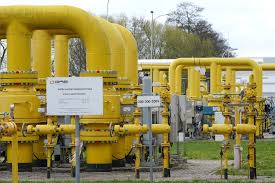Tag Archives: WSJ
Russia’s gas blackmail 2022 Best

For this assignment we will examine Russia’s gas blackmail on NATO countries. Detailed instructions for the final paper: Choose one topic and two news items on it; each news item should be a video clip of at least 2 minutes or a newspaper article of at least 2 pages.
Russia’s gas blackmail
Detailed instructions for the final paper: Choose one topic and two news items on it; each news item should be a video clip of at least 2 minutes or a newspaper article of at least 2 pages. The news items can be from any time in the last 5 years, but they should be from about the same time so they are really on the same topic. Give bibliographic references (and URLs) to the two news items at the top of the first page of your paper; give references to the other sources used in a list at the end of the paper.
Russia’s gas blackmail
To give you a range of perspectives to work with, you must choose one news item from a news organization based outside the United States and one item from a news organization based inside the United States. For the former, acceptable sources include: the Guardian; BBC, DW.com, and Euronews. For the latter, acceptable sources include all the major print (NYT, WSJ, WP, LAT, APNews, Reuters) and broadcast (ABC, NBC, CBS, PBS, CNN, FOX, MSNBC) outlets. If you want to use a different source, ask me first if it’s okay. Similarly, if you want to do a wide-ranging comparison within U.S. news sources, ask me for approval.
Russia’s gas blackmail
These need to be fact-based news items; opinion pieces are not acceptable. For each news item, answer the following questions and give evidence for your answers by briefly quoting the text or describing the video and audio. The approximate required length is given for each news item. But don’t allow any paragraph to go longer than about half of a double-spaced page; if needed, break it into more paragraphs even if only one paragraph is suggested here. 1. What were the main points of information conveyed? That is, describe the facts that this item conveyed. (1 paragraph) 2. Name at least three pieces of information that the item didn’t include, and provide the missing information yourself, from other sources.
Russia’s gas blackmail
Cite these sources in author-date format. (1 para.) 3. What was the most important frame used? (1 para.) See the definition of “frame” below for guidance on how to identify the frame and the evidence for it. 4. What was the second most important frame used? (1 para.) 5. Which sources did the story rely upon? Which sources could have been used but were not? (1 para.) 6. Was the story neutral/balanced or biased concerning partisanship, or another dimension that you choose to focus upon? In answering this, consider whether the frames used and the sources used tended to favor one side over the other.
Russia’s gas blackmail
Specify the type of bias, its direction, and the degree of bias, e.g., roughly balanced, leaning slightly, leaning heavily, or being totally one-sided. (1 para.) 7. What do you think the reporter, editor, or producer should have done differently in order to better fulfill the media organization’s role in our democracy? Specifically, what kinds of un consulted sources, and what absent frame(s) would have enriched the story or made it more balanced? (1 para.) Organize your paper by questions, not by news items. That is, answer question # 1 for your first news item (in one paragraph) and then for your second news item (in a second paragraph), and then do the same for the question # 2, etc. https://youtu.be/_BlbcC9bv8k
Russia’s gas blackmail
Phrase your answers to question # 7 as a conclusion to the paper. Definition of a “frame” in news reporting: – A frame is the interpretation that journalists put on the news. – It’s the conclusion they want you to draw – what they want you to believe and feel. Often this points toward what should be done about a problem, or who should be blamed for it. – Framing involves selecting and emphasizing facts, making moral evaluations, and identifying causes and/or consequences. – Hence, a frame defines problems, tends to give credit or blame to certain actors, and suggests solutions and actions that should be taken.






